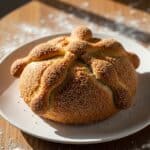Description
Authentic pan de muerto recipe with troubleshooting guide for dense bread. Traditional Mexican Day of the Dead bread with orange zest and anise seeds, proven soft pillowy crumb structure. This recipe delivers step-by-step instructions, make-ahead strategies, and expert tips for perfect results every time.
Ingredients
5 to 5.5 cups all-purpose flour (630-660g)
0.75 cup granulated sugar (150g), plus extra for topping
2 teaspoons active dry yeast (7g) or 1 packet
0.5 cup whole milk, warmed to 110°F (120ml)
4 large eggs, plus 1 egg yolk for brushing
0.5 cup unsalted butter, softened (115g)
2 to 3 tablespoons fresh orange zest
1.5 to 2 teaspoons whole anise seeds
1 teaspoon vanilla extract
0.75 teaspoon salt
2 to 3 tablespoons melted butter for brushing post-bake
Instructions
Activate Your Yeast: Pour warm milk into small bowl. Add yeast and 1 tablespoon sugar. Stir gently and let sit for 5 minutes. You should see foam form on top—this means yeast is alive. If nothing happens, yeast is dead; start over with fresh yeast.
Combine Wet Ingredients: In stand mixer bowl, beat softened butter and remaining sugar until pale and fluffy (about 2 minutes). Add eggs one at a time, beating well after each. Stir in yeast mixture, orange zest, anise seeds, vanilla, and salt. Mix until evenly distributed.
Build Your Dough: Add flour gradually (start with 5 cups). Mix on medium speed for 8-10 minutes until dough pulls away from bowl sides, appears smooth, and feels slightly tacky. Add flour 1 tablespoon at a time if too sticky.
First Rise (Bulk Fermentation): Oil a clean bowl. Transfer dough and cover tightly with plastic wrap or damp towel. Place in warm spot (68-72°F ideal). Let rise until doubled in volume, roughly 1.5 hours on warm day, up to 2 hours on cooler days. Poke test: indentation springs back slowly but doesn’t disappear completely = ready.
Shape Your Pan de Muerto: Turn dough onto lightly floured surface. Divide into two portions (for two medium loaves) or one large loaf. Set aside about 1/8 of dough for bone decorations. Form main dough into round. Place on parchment paper. From reserved dough, roll four bones (about pencil-thick, 4 inches long) and arrange crossed on top. Shape small ball and place in center.
Second Rise: Cover shaped loaves with damp towel. Let rise in warm spot until puffy and visibly larger, about 1 to 1.5 hours. They should look pillow-soft and feel airy when gently poked.
Egg Wash and Bake: Preheat oven to 350°F (175°C). Brush risen loaves with egg yolk mixed with 1 tablespoon water. Bake on middle rack for 30-40 minutes until golden-brown and bottom sounds hollow when tapped. Cover with foil during last 10 minutes if browning too fast.
Sugar Glaze and Cool: Remove pan de muerto from oven. While still warm, brush generously with melted butter. Sprinkle with granulated sugar (or colored sugar). Let cool on baking sheet for at least 15 minutes before transferring to wire rack.
Notes
Orange zest is traditional; orange blossom water works if you can’t find fresh zest (but zest is superior)
Use kitchen scale for accuracy; temperature control (70-72°F during proofing) is essential
After first rise, refrigerate shaped dough for 30 minutes before final rise for predictability
Dutch ovens trap steam, creating crispier crust and better oven spring
Stale pan de muerto makes legendary bread pudding; cube and repurpose
Store fully baked, cooled loaves in freezer up to 6 weeks; thaw overnight and refresh in 300°F oven for 5-10 minutes
Serve with champurrado, atole, or café de olla for authentic pairing
Nutrition
- Serving Size: 1 slice (57 grams)
- Calories: 195
- Sugar: 13 grams
- Sodium: 120 milligrams
- Fat: 5.5 grams
- Saturated Fat: 3 grams
- Unsaturated Fat: 2.5 grams
- Carbohydrates: 31 grams
- Fiber: 0.5 grams
- Protein: 3.5 grams
- Cholesterol: 35 milligrams
Keywords: pan de muerto, Day of the Dead bread, Mexican bread recipe, homemade pan de muerto, bread troubleshooting, dense bread fix, orange zest bread, anise seeds recipe, Día de Muertos, traditional Mexican baking, enriched dough, yeast bread, make-ahead bread recipe, freezer-friendly bread, champurrado pairing
